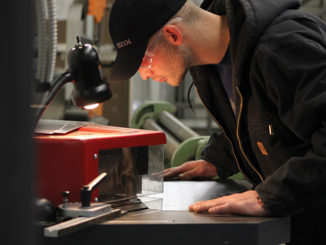
By / Jessica Kirby, Editor, Sheet Metal Journal
Change is inevitable. Whether you are a Bob Dylan fan (times they are a’ changin’) or a Buddhist (Nothing is forever except change), if you haven’t already, you will at some point have to face the reality that nothing stays the same. This issue of Sheet Metal Journal is all about change and embracing the new—even when doing that feels uncomfortable. (I mean, seriously, can we even attempt to cling to sameness after 2.5 years of pandemic changes, day in and day out? I think not.)
The thing about change is, for those who fear it, it is with fear of the unknown. When we change careers, change partners, take a new position, move to a new city—it isn’t the career, partner, position, or city that freaks us out. It is not knowing what will come with this change. Will I fit into this new role? Will I excel? What will others think of me? What if they are jerks? What if I can’t find my way around? And on and on. Not knowing what to be afraid of or if there is even a threat is difficult—debilitating, actually, for some—and managing that isn’t the same as tackling a concrete fear.
In the other camp, those who love change really love it. They thrive on it, sometimes to a fault. A new job, new projects, new team, new commute—all reasons for celebration because they keep the mind sharp and the adrenaline pumping. These folks are rich with ideas, creative and inspired, and they are flexible—except when it comes to some things not changing. That’s when it all goes to hell in a hand basket.
However, I digress. Like with so many things, the key to managing the inevitability of change is a balanced approach. Think positive, stick to the facts, embrace the process, take a breath when our throats threaten to close over in anxiety—all the things.
On August 31, 2022, we will all have to brace for an important change when our fearless leader, SMACNA-BC Executive Director Bruce Sychuk, steps down from his post and saunters off into what promises to be a rich and fulfilling retirement surrounded by friends, family, and plenty of golf in the sunshine. I started working with Bruce my first day of work with Point One Media, May 1, 2007. He ushered me into the world of sheet metal, not by teaching me about the trade, but by teaching me the importance of relationships in the trade. It was a valuable lesson I’ve relied on many times over the past 15 years, and not seeing Bruce’s smiling face at industry events is a change we at Point One will feel for a long time.
In other news, the SMACNA-BC board is currently working on filling Bruce’s shoes. Whoever steps forward to kick start the next chapter of SMACNA-BC’s history will be embodying one of the most impactful changes the association has seen in 26 years, and I am sure the Board will choose well. Watch the spring issue for a broad look at Bruce’s career and successes.
The guest editorial is all about changing your approach to understanding your own beliefs. Take a peek at page 5 for an interesting look at how understanding another’s perspective can strengthen your own.
This issue features three perspectives on changes the sheet metal industry can expect in the coming year (pages 10-14). We look at industry trends, opportunities, and challenges from national, provincial, and industry-specific viewpoints, summarized in our annual construction outlook series. We understand the limitations of predictions and forecasting, but as always, we worked hard to put forward some concrete issues to consider moving forward, such as prompt payment legislation, supply chain issues, and ongoing labour concerns.
While I have your attention, I also want to give a shout out to Women in Construction Week (WIC) March 6-12, 2022. Speaking of change, in Canada, women represent a little more than half of Canada’s total population, and a little more than 60% of women over 15 participated in the workforce in 2019. Of course, COVID derailed some of those numbers, since childcare responsibilities are more prominently shouldered by women, but Canada (and BC and Alberta in particular) are still making important strides in the way women are represented in the workforce.
To get granular, the construction industry continues to struggle to find skilled labour, and part of the solution to that is recruitment in non-traditional sectors, such as women, Aboriginal communities, and newcomers to Canada. And from a birdseye view, it appears we are making gains, since 13% of the total workforce in construction is female (up from 8-12%, depending on geography, in 2015), and the closest contenders are the United States (9%) and the United Kingdom (10%). But here’s the number to focus on: only 4-7% of tradespeople working in construction are females. That means the immense efforts SMACNA and Local 280 are making to recruit and train women are more important than ever. This WIC, take a moment to reflect on how you can help affect change for this important segment of the sheet metal industry.
In the meantime, I hope you enjoy these pages, and I welcome your feedback or suggestions for future issues. As you may have noticed by now, the title of this editorial is misleading—there really isn’t any trouble with change, except maybe fighting it. However, the next time you are faced with an important change, I hope you find the strength to take a page out of John Maxwell’s book: Change is inevitable. Growth is optional. ■



